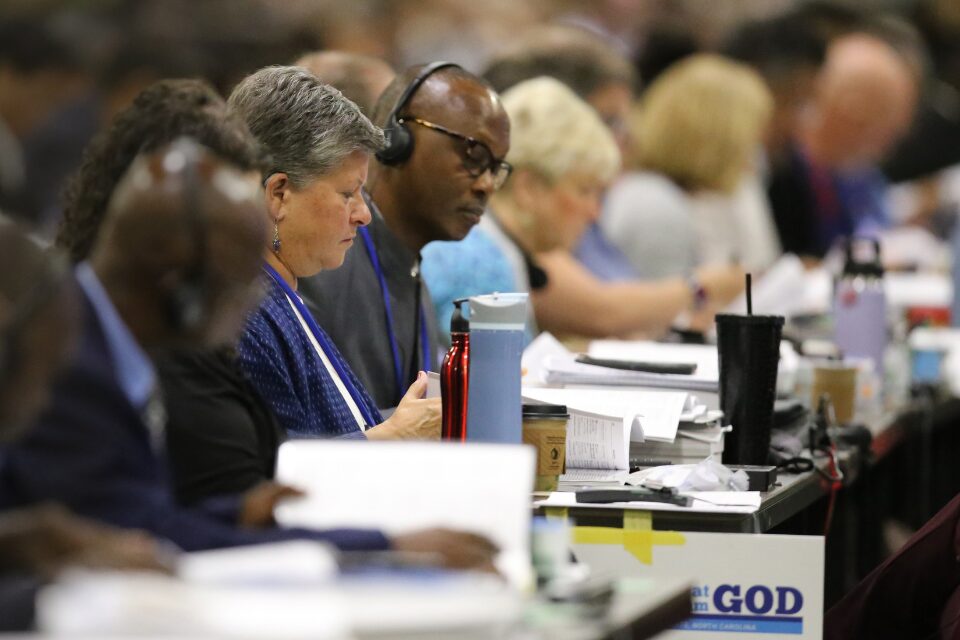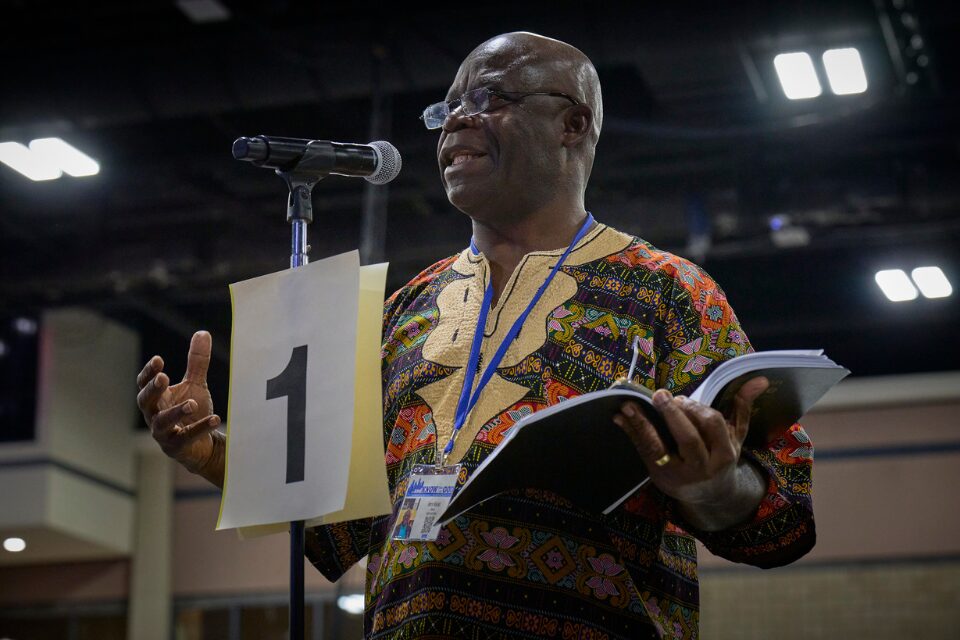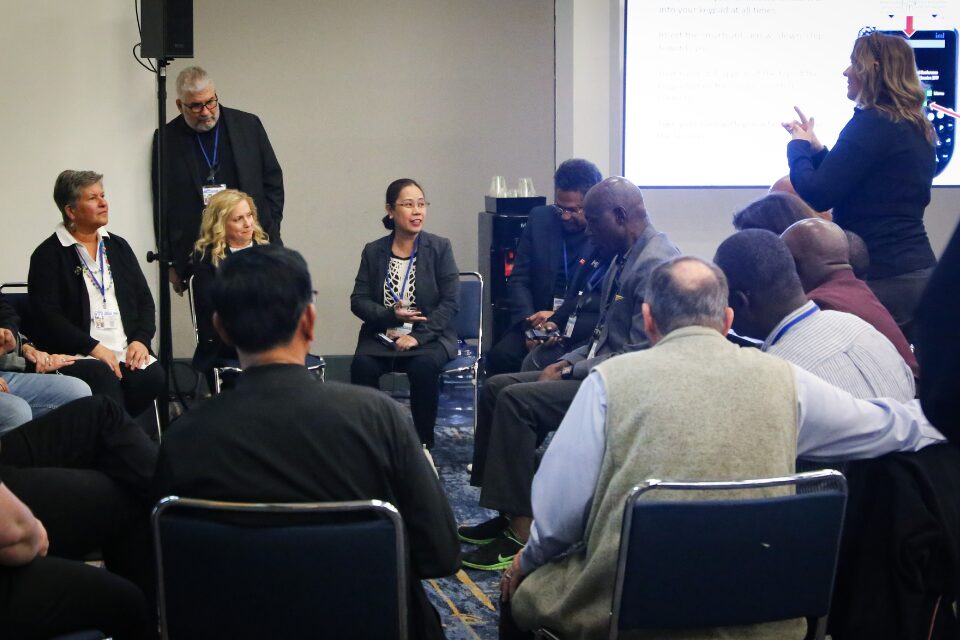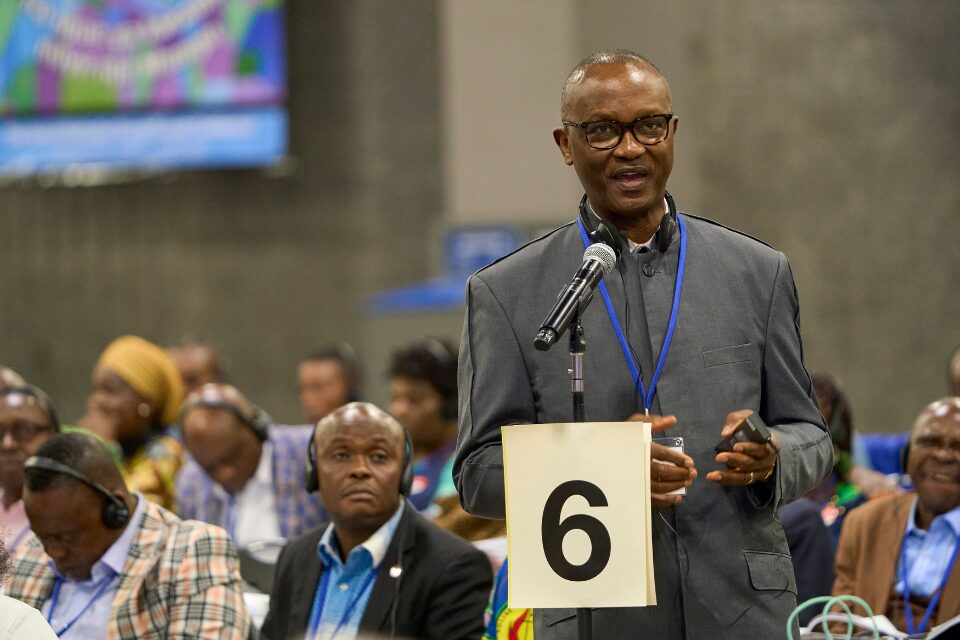On Tuesday, General Conference delegates approved the final three proposals for worldwide regionalization, legislation that hopes to give The United Methodist Church’s geographic regions equal standing in decision-making.
JAMES DEATON
Content Editor
“The passing of regionalization here in Charlotte is a watershed moment for global Methodism. Now, people in different parts of the world can faithfully engage the church’s mission with relevancy and effectiveness in their setting. It passed easily today, but it’s been a long time coming.”
Rev. Charles Boayue, clergy delegate from Birmingham: First UMC, spoke these words minutes after the morning plenary session at the 2024 General Conference. Delegates overwhelmingly approved the final three proposals related to worldwide regionalization, an eight-petition package submitted by the Standing Committee on Central Conference Matters that hopes to give The United Methodist Church’s geographic regions equal standing in decision-making. The rest of the legislation passed last week, including a key constitutional amendment.
The concept of regionalization is not new, and petitions have been presented at previous general conferences. At the last regular session in 2016, a proposal to create a U.S. central conference didn’t even make it out of the legislative committee.
However, the United Methodist Church is in a different place now. Some parts of the church have disaffiliated, and some of these individuals would have been among those who may have disagreed with regionalization.
Nichea Ver Veer Guy, lay delegate from Grand Rapids: Trinity UMC, says that what’s happening to the church is a “perfect storm because disaffiliation allowed us to think bigger and broader than we have in the past. So, we’re looking at regionalization as really an equity piece so that we build a system that will allow us to live into what it is our geographic region is passionate about or the justice issues that stand out — all of the aspects that make us unique as a region.”

Regionalization is necessary because The United Methodist Church has been growing in different parts of the world at different rates, and the ministry needs vary in each region. There has been significant growth in places like Africa, but here in the United States, the church has declined in membership over decades. The passing of regionalization allows different parts of the world to decide for themselves how they are to make disciples of Jesus Christ.
Charles notes that the needs for ministry in Africa and some obstacles are quite different from those in the United States. He explains, “A [Book of] Discipline or a church organization where every important matter is decided by everybody in a world that is so wide and different has had a diminishing impact on the morale of the denomination.”
He gave two examples from yesterday’s business sessions where a significant portion of time was dedicated to discussing matters exclusively focused on a particular geographic context, the United States or Africa. These matters didn’t pertain to all, but based on the current structure, everyone had to vote on them. Charles says, “These matters should be discussed in those regions and decided there because ministry, while its goal is to make disciples of Jesus Christ for the transformation of the world, takes a different methodology in every setting.”
General Conference has traditionally been an event that has been U.S.-centric, and U.S. issues have dominated a great deal of floor time and legislation. Nichea says that General Conference has also been dominated by how things are presented — the cultural aspects and the leadership style — and is still very U.S.-centric. “These are things we are going to have to relearn because we are trying to make it much more global. We are taking steps here in Charlotte. Did you notice how many of our global siblings are coming to the microphone to speak?”

The concept of regionalization decenters the church, putting the United States on equal terms as the other parts of the world, and recenters our work on the mission Christ has given The United Methodist Church and strengthens our common bonds as the body of Christ.
It’s a contextual necessity and reality, says Charles, that the church is coming to terms with. And it became front and center with the debate over whether to and how to work with our LGBTQ siblings. “We’ve seen a wide divide between African United Methodist and American United Methodist on the issue of LGBTQIA inclusion, and it’s been acrimonious and painful on every side. So, with that tearing the church apart, the thought was elevated to say, look, why don’t we regionalize.”
Under the regionalization legislation, the United States and each central conference — church regions in Africa, Europe, and the Philippines — would become regional conferences with the same authority to adapt the Book of Discipline, the denomination’s policy book, for more missional effectiveness. Sections of the Book of Discipline related to criteria for ordination, licensed ministry, and marriage rites could be uniquely appropriated for each region’s context. Some parts of The United Methodist Church can do that already under church law.
Charles says regionalization will bring much-needed flexibility to ministry in The United Methodist Church. Still, it does not guarantee that all parts of the world will say yes to the same things. “For example, in most of Africa,” he explains, “they are not likely to adapt their regional Book of Discipline to allow the same things that the United States will allow. But at least in the case of Western Europe and the United States, now the church can say yes to whoever God calls, whoever seeks to serve God in the church faithfully. There will be no limitation to what you can do on behalf of Christ in the world. Whether you are gay, lesbian, or transgender, you are a child of God, and the church invites you to live out your calling in The United Methodist Church fully.”

Nowhere does the regionalization legislation mention human sexuality. It also does not end the denomination’s bans on same-sex weddings and “self-avowed practicing” queer clergy. However, if ratified, the regionalization amendment would provide each regional conference the freedom to set its clergy qualifications and chargeable offenses under church law.
The central conferences have already been able to do a lot of contextual customization with supplemental Disciplines, but the church in the United States has not. What the legislation passed will do, if ratified, will create a pathway for new ways of doing and being church.
Nichea says, “That opens this wide window of possibilities. So this is a huge opportunity for us in the United States to try to get it right, go back to square one, change some of the ways we’ve been doing things, and expand and live into being the body of Christ.”
So, why is regionalization important to Michigan United Methodists? Charles says a major human rights matter has been rectified by the vote of the United Methodist General Conference. “For people who are LGBTQIA, and I’m not one, but I can imagine, as a Black person, the hurdles we have had to endure and seek to overcome for our full humanity to not only be recognized but affirmed and lived out freely without apologies.” Regionalization will allow the church to set policies that affirm the rights of all the people in their contexts, according to local laws and guidelines.
Regionalization will also allow the church in the United States to create affirming church policies for the cultural context here that fully welcome all of God’s children into ministry, whether ordained or laity. Current policies do not allow it, but this regionalization legislation is helping to open the doorway for future changes that will affirm the calling of LGBTQ persons in ministry.
“This vote matters to Michigan because you can be whatever God calls you to be, and the church will hold you accountable, as it has held other people who have been allowed to be what God wants them to be. That freedom [to contextualize] is coming to Michigan, it’s coming to Africa, and throughout the world, and it will take some time as the church adjusts to this new reality. It also means that more people can serve Jesus Christ unapologetically.”

For Nichea, the Michigan Conference has already been living out some of the implications of regionalization, so it’s a chance to be a leader in the denomination. “We seem to have worked through some of the inclusivity issues and a greater understanding of our global relationships. We’re ready to move on and be in ministry. So, for Michigan, I think it’s an opportunity to be a leader and show other conferences that there is a capacity to exist as a United Methodist church with new rules and guidelines and new opportunities.”
One of the unresolved questions Charles sees at this year’s General Conference is what the churches in Africa will do now that regionalization has passed and is moving toward ratification. Will they remain United Methodist or choose to go independent or with another Wesleyan denomination?
“I pray that Africa will remain with The United Methodist Church,” says Charles, “because as an African who grew up in Liberia and lived there my first 23 years, and who have lived in America for the last 41 years, I can say that the needs of Africa are more aligned with flexibility and with a kind of progressive approach to issues of human rights, women’s rights, rights of workers, freedom from colonialism and its vestiges. And that the alignment of The United Methodist Church with the needs of Africa in the long run are more in tune with each other than just the issue of human sexuality. But what they will do will shape the future of The United Methodist Church. If Africa stays, The United Methodist Church will have a more global platform to engage the world. If it leaves, The United Methodist Church has to reestablish a global presence and witness. I hope they stay.”
The constitutional amendment on regionalization must be voted on and ratified by all the annual conferences in The United Methodist Church. It will need at least a two-thirds total vote of annual conference lay and clergy voters. So, each annual conference will have to vote, and the tallies will be submitted and held until all the annual conferences have voted. And two-thirds of that total number of aggregate votes is required for ratification. In Michigan, this vote will happen at the 2025 Michigan Annual Conference.
Charles believes that once the amendment is ratified, future General Conferences can focus more on evangelizing the world, matters of justice and peace, and other issues that affect the whole world. The different regions can then handle the specific details of ministry implementation.
Nichea also believes that regionalization and the hard work ahead as we live into a new expression of The United Methodist Church will allow us to empower one another. “I see this opportunity to remove those weights that have almost drowned us — those injustices or lack of understanding or whatever it may be — so we can just fly and get those ministries we are passionate about in the Michigan Conference off the ground. I know Michigan is good at that. We have a grip on mission in all capacities — local and abroad — and we’ll be able to do all kinds of wonderful things and have the energy to create new ideas with new possibilities.”
Last Updated on May 2, 2024

